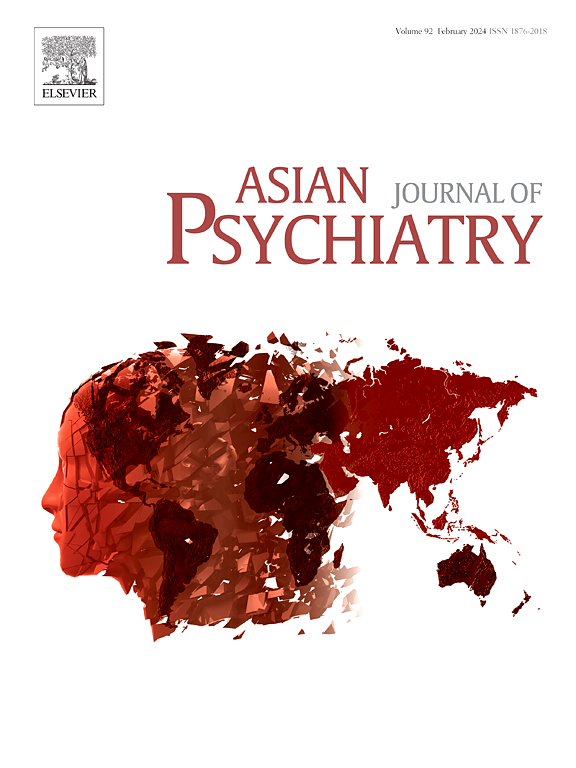以社区为基础的一揽子精神保健服务对解决孟加拉国围产期精神障碍的有效性:分组随机对照试验
IF 3.8
4区 医学
Q1 PSYCHIATRY
引用次数: 0
摘要
背景在中低收入国家,妇女的产前精神障碍会影响她们的妊娠和孩子的大脑发育。然而,为了解决这一问题,孟加拉国还没有针对社区一级服务提供者的具体指导原则。因此,我们旨在开发基于社区的心理保健(CBMHC)服务包,并测试其在减少围产期母亲抑郁、焦虑和压力方面的有效性。方法在 2017 年和 2018 年采用分组随机对照试验(cRCT)来测试 CBMHC 服务包。一组母亲在接受常规孕产妇护理的同时还接受了该套餐,而另一组母亲仅接受常规孕产妇护理。采用配对样本t检验来评估抑郁、焦虑和压力量表-21(DASS-21)和EuroQol-5 Dimension and 3 Level(EQ5D3L)量表在基线和终点的平均变化。采用线性混合效应模型评估 DASS-21 评分与 EQ5D3L 之间的关系。结果1215 名参与者参加了干预组,其中 605 人,对照组 610 人。干预组和对照组的抑郁、焦虑和压力测量值均显著下降。以压力评分的变化来衡量,干预组压力水平的降低幅度明显高于对照组(差值:1.2,95 % CI:0.1,2.2)。干预组的 EQ5D3L 指数明显改善,在终点线时比对照组多 0.02 个单位(差异:0.02,95 % CI:0.007,0.03)。与对照组相比,干预组的行动能力、日常活动、疼痛或不适、抑郁和焦虑水平分别提高了 1.4%、7.6%、4.4%、2.6% 和 0.4%。这些改善在统计学上具有重要意义。干预组和常规护理组的 DASS-21 评分与 EQ-5D3L 指数和视觉模拟量表 (VAS) 评分均呈显著负相关,这表明当常见精神障碍减少时,EQ5D3L 也随之改善:NCT03678415本文章由计算机程序翻译,如有差异,请以英文原文为准。
Effectiveness of a package of community-based mental healthcare services to address perinatal mental disorders in Bangladesh: A cluster-randomized controlled trial
Background
Perinatal mental disorders of women have an impact on their pregnancy and their child’s brain development across low and middle-income countries. However, to address this issue, there are no specific guidelines for community-level service providers in Bangladesh. Therefore, we aimed to develop a community-based mental healthcare (CBMHC) service package and test its effectiveness in reducing depression, anxiety, and stress among mothers during the perinatal period.
Methods
A cluster-randomized controlled trial (cRCT) was applied to test the CBMHC package in 2017 and 2018. It was provided to one group of mothers along with routine maternal care while another group received only routine maternal care. Paired sample t-test was applied to assess mean changes at baseline and endline in the Depression, Anxiety, and Stress Scales-21 (DASS-21) and EuroQol-5 Dimension and 3 Level (EQ5D3L) scales. A linear mixed-effects model was used to assess the relationship between the DASS-21 score and EQ5D3L.
Results
1215 participants were enrolled, including 605 in the intervention group and 610 in the control group. Measures of depression, anxiety, and stress were significantly decreased in both groups. Reduction in the levels of stress, as measured by changes in the stress score, were significantly greater in the intervention than in the control group (diff: 1.2, 95 % CI: 0.1, 2.2). The EQ5D3L index improved significantly, 0.02 units more at endline in the intervention group than in the control group (diff: 0.02, 95 % CI: 0.007, 0.03). The levels of mobility, usual activities, pain or discomfort, depression, and anxiety improved by 1.4 %, 7.6 %, 4.4 %, 2.6 %, and 0.4 % more, respectively, in the intervention group compared to the control groups. These improvements were statistically significant. The DASS-21 score was negatively and significantly correlated with both the EQ-5D3L index and the Visual Analogue Scale (VAS) score for the intervention group as well as for the usual care group, indicating that EQ5D3L improved when common mental disorders decreased.
Conclusion
Although the improvements were modest, a CBMHC service package was effective in reducing perinatal levels of stress among Bangladeshi rural women.
Trial Registration
ClinicalTrials.gov ID: NCT03678415
求助全文
通过发布文献求助,成功后即可免费获取论文全文。
去求助
来源期刊

Asian journal of psychiatry
Medicine-Psychiatry and Mental Health
CiteScore
12.70
自引率
5.30%
发文量
297
审稿时长
35 days
期刊介绍:
The Asian Journal of Psychiatry serves as a comprehensive resource for psychiatrists, mental health clinicians, neurologists, physicians, mental health students, and policymakers. Its goal is to facilitate the exchange of research findings and clinical practices between Asia and the global community. The journal focuses on psychiatric research relevant to Asia, covering preclinical, clinical, service system, and policy development topics. It also highlights the socio-cultural diversity of the region in relation to mental health.
 求助内容:
求助内容: 应助结果提醒方式:
应助结果提醒方式:


